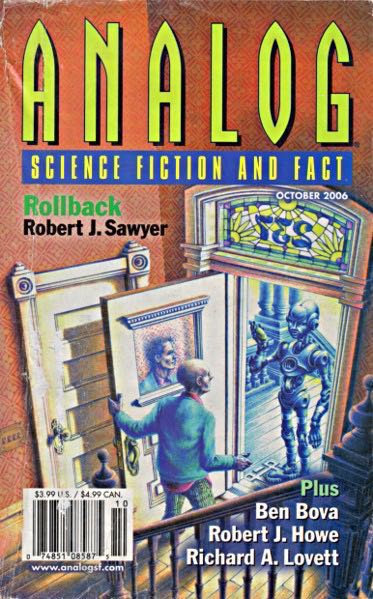Analog Science Fiction and Fact, October 2006
144 pages
I enjoyed all the stories in this issue. Rollback has an excellent premise and shows much promise, although I find it marred by Sawyer's attempt to inject referencing to things like Slashdot, and to Jody Foster's role in Contact. His infodumps about actual historical events are clumsy and (to someone like me) entirely unnecessary.
The letters column and Stanley Schmidt's editorial made me notice a particular problem in the science fiction genre: a current of righteous, exclusivist superiority. The SF community considers itself enlightened in a way that the rest of the world may never attain. It's true that most new technologies have been written about in SF for decades, so the questions they pose do not take any SF fan by surprise. E.g., the ethical implications of cloning were explored in myriad stories, long before cloning became a reality.
That should not cause SF fans to feel smugly superior. The SF community is not better than the rest of the world. It is neither at the forefront of technological breakthroughs nor a driving force for social change. It is a niche literary genre that is fast developing an insular, ivory-tower elitism--an elitism just as destructive and self-defeating as the elitism of the literary fiction that SF writers and fans so often sneer at. It may be too late. SF is no longer relevant, if indeed it ever was.
I'm still a fan of science fiction stories. I think, though, that I will stop being a fan of the science fiction community.
- Serial (1 of 4): Rollback, by Robert J. Sawyer - Humans make radio contact with a nearby star system. Robotics mogul Cody McGavin thinks that Sarah Halifax, the astronomer who deciphered the first message, should stick around to analyze future messages. To that end, he offers to pay for multi-billion-dollar rejuvenation operations for Sarah and her husband.
- Novelette: Takes Two to Tangle, by Ben Bova - An infamous explorer returns from deep space, claiming to have gone through a black hole to another universe. He hires a physicist to invent a matter transmitter device, to the dismay of various religious factions who fear the technology.
- Novelette: From Wayfield, From Malagasy, by Robert J. Howe - A marooned crew's only hope for survival is to get help from the natives, but the native people have no concept of trade or sharing: every man makes all his possessions himself, from raw materials.
- Short story: Rival of Mars, by David Walton - When childbearing and guardianship are separate jobs licensed by the government, one man struggles whether to sacrifice his career to stay with the woman he loves.
- Short story: Nigerian Scam, by Richard A. Lovett - A convalescing cyclist answers a Nigerian Scam email purportedly from aliens. It turns out to be genuine, and the aliens give him fantastic new technology in return for his thoughts about human society and culture.
- Short-short: SETI Triumphant, by Richard Thieme and Aaron Ximm - Humorous short-short. SETI gets a response to mankind's broadcasts: a form rejection letter.
- Science fact: The Great Sumatran Earthquakes of 2004-5, by Richard A. Lovett - The Sumatran earthquakes and tsunami revealed that much of what we know about major earthquakes is wrong. Since we only get a handful of truly major earthquakes each century, progress in the field is slow.
